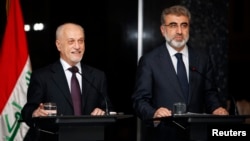BAGHDAD —
Oil exports from anywhere in Iraq to Turkey need the central government's approval, Baghdad and Ankara said on Sunday after a bilateral meeting aimed at diffusing a row over energy exports from Iraq's autonomous Kurdish region.
Turkey, hungry for energy and dependent on imports for almost all of its needs, wants Iraqi Kurdistan's oil to help diversify its energy supplies and reduce its ballooning $60 billion annual energy bill.
But Turkey's courtship of the Kurdistan Regional Government (KRG) has infuriated the central government in Baghdad, which says it has sole authority to manage Iraqi energy resources.
“We agree that any exports must be with the approval of the Iraqi government and we will discuss the mechanism,” Iraq's deputy prime minister for energy Hussain al-Shahristani told a news conference with Turkey's Energy Minister Taner Yildiz in the Iraqi capital.
Yildiz said Turkey would seek Baghdad's approval for the commercial export of oil from Iraqi Kurdistan.
“We aim to win Iraq central government's consent for oil trade from the KRG to Turkey and to start a cooperation plan to serve the interests of all three parties,” a joint declaration from the ministers said.
Turkey and Iraqi Kurdistan signed a multi-billion-dollar energy package last week, sources close to the deal said on Friday, that will help transform the Iraqi region into an oil and gas powerhouse.
The Turkish foreign ministry has since said the deals had not been finalized and that it would seek Baghdad's cooperation.
Yildiz said the two sides had also discussed an existing plan to extend a pipeline to take crude oil from Iraq's southern Basra oil fields to Turkey.
It was Yildiz's first visit to Iraq since his plane was denied permission to land by Baghdad late last year when he tried to attend an annual energy conference in Arbil, Iraqi Kurdistan, amid the long-running oil dispute.
Yildiz will travel on to Arbil for the same conference, which starts on Monday.
Baghdad says Kurdish efforts towards oil independence could lead to the breakup of the country and the dispute has also raised concern in Washington.
Shahristani said on Thursday any energy deal with Arbil would be “an encroachment on the sovereignty of Iraq”.
Autonomous since 1991, Iraqi Kurdistan has often chafed against the central government and even threatened to secede, but still relies on Baghdad for a slice of the OPEC producer's $100-billion-plus budget.
It is already trucking its oil to world markets through Turkey and it plans to open a new export pipeline by the end of the year, angering Baghdad further.
Turkey, hungry for energy and dependent on imports for almost all of its needs, wants Iraqi Kurdistan's oil to help diversify its energy supplies and reduce its ballooning $60 billion annual energy bill.
But Turkey's courtship of the Kurdistan Regional Government (KRG) has infuriated the central government in Baghdad, which says it has sole authority to manage Iraqi energy resources.
“We agree that any exports must be with the approval of the Iraqi government and we will discuss the mechanism,” Iraq's deputy prime minister for energy Hussain al-Shahristani told a news conference with Turkey's Energy Minister Taner Yildiz in the Iraqi capital.
Yildiz said Turkey would seek Baghdad's approval for the commercial export of oil from Iraqi Kurdistan.
“We aim to win Iraq central government's consent for oil trade from the KRG to Turkey and to start a cooperation plan to serve the interests of all three parties,” a joint declaration from the ministers said.
Turkey and Iraqi Kurdistan signed a multi-billion-dollar energy package last week, sources close to the deal said on Friday, that will help transform the Iraqi region into an oil and gas powerhouse.
The Turkish foreign ministry has since said the deals had not been finalized and that it would seek Baghdad's cooperation.
Yildiz said the two sides had also discussed an existing plan to extend a pipeline to take crude oil from Iraq's southern Basra oil fields to Turkey.
It was Yildiz's first visit to Iraq since his plane was denied permission to land by Baghdad late last year when he tried to attend an annual energy conference in Arbil, Iraqi Kurdistan, amid the long-running oil dispute.
Yildiz will travel on to Arbil for the same conference, which starts on Monday.
Baghdad says Kurdish efforts towards oil independence could lead to the breakup of the country and the dispute has also raised concern in Washington.
Shahristani said on Thursday any energy deal with Arbil would be “an encroachment on the sovereignty of Iraq”.
Autonomous since 1991, Iraqi Kurdistan has often chafed against the central government and even threatened to secede, but still relies on Baghdad for a slice of the OPEC producer's $100-billion-plus budget.
It is already trucking its oil to world markets through Turkey and it plans to open a new export pipeline by the end of the year, angering Baghdad further.





